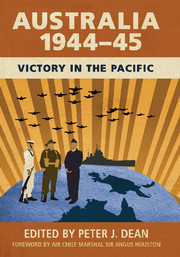Book contents
- Frontmatter
- Dedication
- Foreword
- Contents
- Maps and chart
- Figures and table
- Contributors
- Acknowledgements
- Abbreviations
- Military symbols on maps
- Introduction
- PART 1 STRATEGY
- PART 2 AUSTRALIA AT WAR
- PART 3 GREEN ARMOUR AND SPECIAL OPERATIONS
- PART 4 THE NAVAL AND AIR WAR
- PART 5 THE NEW GUINEA CAMPAIGN
- PART 6 THE BORNEO CAMPAIGN
- 12 Amphibious Warfare: Training and Logistics, 1942–45
- 13 ‘To capture Tarakan’: Was Operation Oboe 1 Unnecessary?
- 14 Unique in the history of the AIF’: Operations in British Borneo
- 15 ‘Calling the tune’: Australian and Allied Operations at Balikpapan
- Afterword: And Then Came Peace?
- Index
- References
13 - ‘To capture Tarakan’: Was Operation Oboe 1 Unnecessary?
from PART 6 - THE BORNEO CAMPAIGN
Published online by Cambridge University Press: 05 December 2015
- Frontmatter
- Dedication
- Foreword
- Contents
- Maps and chart
- Figures and table
- Contributors
- Acknowledgements
- Abbreviations
- Military symbols on maps
- Introduction
- PART 1 STRATEGY
- PART 2 AUSTRALIA AT WAR
- PART 3 GREEN ARMOUR AND SPECIAL OPERATIONS
- PART 4 THE NAVAL AND AIR WAR
- PART 5 THE NEW GUINEA CAMPAIGN
- PART 6 THE BORNEO CAMPAIGN
- 12 Amphibious Warfare: Training and Logistics, 1942–45
- 13 ‘To capture Tarakan’: Was Operation Oboe 1 Unnecessary?
- 14 Unique in the history of the AIF’: Operations in British Borneo
- 15 ‘Calling the tune’: Australian and Allied Operations at Balikpapan
- Afterword: And Then Came Peace?
- Index
- References
Summary
Oboe 1 – the Allied campaign for the island of Tarakan off the northeast coast of Borneo– was the first of three major landings in Borneo by I Australian Corps. On 21 March 1945, MacArthur instructed the commander of I Corps, Lieutenant General Sir Leslie Morshead, to seize Tarakan and destroy the Japanese forces there. The Netherlands East Indies government was to be re-established and the oil installations conserved. As soon as the island's airfield was repaired, the Royal Australian Air Force (RAAF) planned to move in several squadrons to support the next two landings at Brunei Bay and Balikpapan. Morshead allocated the 26th Brigade Group of the 9th Australian Division to assault Tarakan. The date of the landing was fixed at 1 May 1945. In contrast to earlier Australian campaigns, the Oboe operations would receive lavish support from Allied air and naval forces. But, despite this, Oboe 1 would prove to be far more difficult – and controversial – than expected.
AN ‘UNNECESSARY WAR’ IN BORNEO?
Tarakan has always been regarded as part of what journalist Peter Charlton called ‘the unnecessary war’: one of the 1945 campaigns that cost Australian lives in Borneo and the islands to no purpose. More specifically, Oboe 1 was criticised in the Australian official histories as a costly failure because of the severe problems and long delay in establishing an air base on the island to support the later Borneo landings, and the heavy casualties suffered by the Australian assault force. The campaign last received an in-depth examination in 1997 in Tarakan: An Australian Tragedy by Peter Stanley (co-author of this chapter). While this work qualified Charlton's interpretation by stressing that US evidence made the genesis and justification for the operation more plausible, it accepted the conventional view that ultimately the operation was not worth the cost: hence the ‘tragedy’ in the title.
Tarakan's enduring reputation as a futile campaign or wasted effort deserves to be examined afresh. By altering the thrust of historical enquiry, from the question ‘why did Oboe 1 happen?’ to ‘what good did it do?’ – and by re-examining the available literature and evidence – a new view of Tarakan emerges. The result of this approach has been both a reaffirmation of the essential narrative of the ground operations, but also a substantially new interpretation of the consequences of and justification for the campaign.
- Type
- Chapter
- Information
- Australia 1944–45Victory in the Pacific, pp. 278 - 297Publisher: Cambridge University PressPrint publication year: 2015



